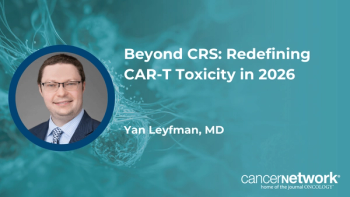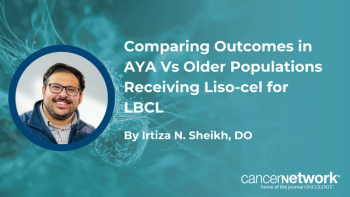
Using Clonal Hematopoiesis to Assess Risk in Lymphoma Patients
Researchers studied clonal hematopoiesis of indeterminate potential (CHIP) as a way to assess risk for increased mortality in lymphoma patients.
In a novel population-based study examining clonal hematopoiesis in lymphoma patients, researchers found that clonal hematopoiesis of indeterminate potential (CHIP)-especially mutations in DNA damage response genes (PPM1D/TP53)-is correlated with increased mortality. These findings (
Somatic driver mutations in hematopoietic stem cells could mediate CHIP. In lymphoma patients, CHIP predicts for therapy-related myeloid neoplasms and inferior survival following autologous stem cell transplantation, according to a recent large single-center
The researchers identified patients who underwent leukapheresis at all Danish transplant centers between 2000 and 2012, and extracted DNA and RNA from mobilized peripheral blood products. They then performed targeted sequencing of all samples designed to cover more than 95% of mutations significantly linked to CHIP: ASXL1, ASXL2, BCOR, BRCC3, CBL, CREBBP, DNMT3A, ETV6, GNB1, IDH1, IDH2, JAK2, KRAS, NRAS, PPM1D, RAD21, SF3B1, SRSF2, TET2, and TP53. For low-level mutations and secure variant calling, Husby and colleagues employed unique molecular identifiers. The team mined prospective clinical patient data from four national Danish registries.
The researchers included samples representing 574 patients (median age, 55.5 years; median follow-up time for survivors, 9.2 years). Lymphoma subtypes mirrored those usually chosen for autologous transplantation: diffuse large B-cell lymphoma (n = 191), follicular lymphoma (n = 102), mantle cell lymphoma (n = 88), Hodgkin lymphoma (n = 80), peripheral T-cell lymphoma (n = 77), and other histologies (n = 36).
In total, 191 patients (33.3%) demonstrated somatic mutations fulfilling CHIP criteria, with the most frequently mutated genes being DNMT3A (n = 59; 28%), TET2 (n = 48; 23%), PPM1D (n = 34; 16%), ASXL1 (n = 21; 10%), and TP53 (n = 18; 8%). Of note, CHIP mutations were more common in patients older than 60 years (P = .002), and the prevalence of CHIP was correlated with lower overall survival (P = .004) and event-free survival (P = .03). Furthermore, CHIP was significantly linked to risk of biopsy-confirmed therapy-related myeloid neoplasms (P = .03) and a higher chance of receiving blood transfusions following autologous transplant (P = .027).
In particular, patients with DNA damage response genes PPM1D and TP53 (8.3%) demonstrated an increased risk of adverse outcomes. Moreover, overall survival and event-free survival were significantly worse with DNA damage pathway mutations.
“These data support the evaluation of CHIP for risk assessment in lymphoma patients before high-dose chemotherapy,” concluded the researchers. “Our study also identifies increased rates of several clinically relevant adverse outcomes (severe infections, blood transfusions, and secondary cancers) in lymphoma patients with clonal hematopoiesis.”
Newsletter
Stay up to date on recent advances in the multidisciplinary approach to cancer.
Related Content




















































